Health watch
Not deadly but can cause a huge economic impact :
Novel Influenza
Suharshi Perera
Novel Influenza A(H1N1) virus which has plunged to pandemic state
today, has become a threat to the Sri Lanka's health system as its
economic impact is very high due to its very high spreading capacity,
even though the disease is not deadly, Epidemiologist, Epidemiological
Unit of the Health Ministry Dr. Sudath Peiris says.
|
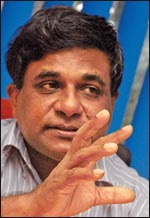
Dr. Sudath Peiris (MBBS, MSc in Com.Med, Msc in Epidemiology)
Pictures by Ruwan de Silva
|
Influenza virus unlike other viral diseases changes its genetic
structure frequently.
For example the measles virus retained the same viral and genetic
structure for the past 600 years. Once a person is infected, immunity to
measles develops within his body so only once in life measles can attack
a person. But humans can be infected by Influenza virus several times in
life since the immunity developed to a certain variant of Influenza may
not be strong enough for another variant, he said.
What is Novel Influenza?
Novel Influenza A(H1N1) is the newly mutilated Influenza virus. Human
beings have not developed resistance towards this new variant of
Influenza. Therefore it started spreading across countries.
The virus is an adaptation of human influenza virus, avian influenza
virus and swine influenza virus. It is a mix of genetical materials of
all these three sources. It first surfaced in Mexico in early April this
year and there were no specific tests to identify the virus, leading to
comparatively higher death rates than the seasonal influenza. It spread
rapidly across the American region and the relatively high mortality
created a fear psychosis among people that it was very deadly.
By June, studies correctly identified the disease. It also revealed
that the case fatality of this new influenza is not very different from
that of the common seasonal influenza. However, because it is a new
virus the total population is non immune to the disease.
Thus it can spread fast reporting more cases compared to a seasonal
influenza. Majority of those who died in the disease were with an immune
deficiency status. Most of them were above 65 years old with underlined
chronic lung, heart and kidney diseases.
Swine flu
At the very beginning when the disease was being researched, the
genetic structure of the virus had a resemblance to the Swine Influenza
virus.
Different variants of the Influenza virus affect different animals
like birds and pigs.
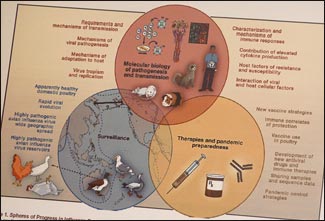
However, the studies conducted later revealed that the virus does not
transmit from pigs but it is a combination of swine influenza, avian
influenza and human influenza calling it the Novel Influenza A(H1N1).
How does A(H1N1) transmitted?
The A(H1N1) virus can be transmitted from respiratory routes. Unlike
the diseases transmitted through food and water or sexual routes, it is
very difficult to contain air- borne diseases.
The disease can be transmitted via droplets expelled by speaking.
Sneezing or coughing.
With global travel, in a few months the disease spread world over
becoming pandemic. Health authorities take measures to control the
disease entering the country as it is impossible to contain totally.
Another difficulty in containing the disease is that every case is
not symptomatic. If 100 persons are infected, the majority does not show
symptoms but all 100 are disease carriers. Only 10 percent of the
infected shows classical symptoms. Therefore it is impossible to contain
it totally.
Symptoms
The main symptoms of the Novel Influenza are similar to any other
influenza.
1. Fever (could be high or mild)
2. Cough
3. Headache
4. Body aches
5. Sore throat
6. Runny nose
Precautions
1. Avoid close contact with people who show influenza like symptoms
2. Avoid touching mouth and nose
3. Clean hands thoroughly with soap and water, or cleanse them with an
alcohol based hand rub on a regular basis (if touching the mouth and
nose or surfaces that are potentially contaminated)
4. Avoid close contact with people who might be ill
5. Reduce the time spent in crowded settings if possible
6. Improve airflow in your living space by opening windows
7. Practice good health habits including adequate sleep, eating
nutritious food and keeping physically active
Using a mask
If one is not infected wearing a mask is not needed. But the infected
can wear masks to prevent the disease being transmitted to others.
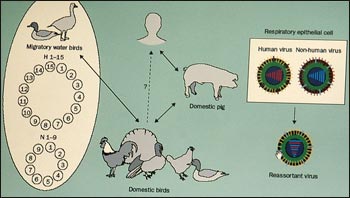 If a person is having close contacts with an infected it is advisable
to wear a mask. It should be disposed immediately and properly after
contact and cleanse the hands thoroughly. If a person is having close contacts with an infected it is advisable
to wear a mask. It should be disposed immediately and properly after
contact and cleanse the hands thoroughly.
The correct use of a mask is very essential and the incorrect use
increases the chance of spreading infections.
As responsible citizens we can prevent the spread of the disease if
we suspect that we are infected. If one show the above symptoms
1. Stay at home and keep away from work, school or crowds
2. Rest and take plenty of fluids
3. Cover nose and moth when coughing and sneezing. If using tissues make
sure you dispose of them carefully.
4. If there is no tissue around cover your mouth as much as possible
with the crook of the elbow when coughing and sneezing
5. Use a mask when having contacts with others and make sure to do so in
the correct way.
6. Inform family and friends and try to avoid contact with other people
Apart from the above measures the infected may contact a health
professional before traveling to a health facility to discuss whether a
medical examination is necessary. Refrain from taking antiviral without
medical advice.
A person should seek medical advice if one experience shortness of
breath or difficulty in breathing or if fever continues more than three
days.
Novel Influenza could be treated effectively if the infected reach a
Government Hospital immediately. Certain antiviral like Tami flu are
used to treat the disease. Sri Lanka is also armed with a stock of Novel
Influenza antiviral drugs donated by WHO.
However, it is only available with Government Hospital. Those drugs
are not made available with the private sector as if used
indiscriminately the virus may develop resistance to those antiviral and
it will be difficult to treat complicated cases.
Economic impact
The Novel Influenza can create a huge economic impact on Sri Lanka.
As the cost of researched drugs is very high and the entire
population is susceptible to the new virus if spreads it will be a
massive burden on the country's economy. Unnecessary fear psychosis
about the disease may cramp the economic activities of the country.
Unnecessary travel bans will affect the tourism industry and the
unnecessary medical attention to the disease may lead to over treating
the situation.
Therefore, a proper understanding about the spread of the disease is
vital.
We have to act cautiously till the peak of the epidemic passes.
HealthWatch Medical Crossword No. 38
-Prize winners-
|

Colombo University Science Faculty undergraduate R.D.J. Amath
who won the 2nd prize in Crossword No. 37, picking a prize
winner in draw No. 38. |
The following are the prize winners of the Daily News HealthWatch
Medical Crossword Draw No. 38 held Saturday August 15 at WISH Institute
auditorium'.
The Health Education Crossword was sponsored by the Wickremarachchi
Institute of Sight and Hearing - WISH.
The chief guest at the draw was the Australian Trade Commissions'
Business Development Manager in Sri Lanka Shameel Javadh who had come
with his wife and daughter for the event, as he was interested in this
new health education feature in the media where for the first time the
Medical Advisory panel in the Daily News medical page HealthWatch has
started using the normal crossword feature for health education with
success.
Shameel said that he came for the draw on invitation by the crossword
sponsor Mihiri Wickremarachchi, Head of the WISH institute and the
HealthWatch Medical Advisory panel, as it gives him an opportunity to
speak to the assembled who had won prizes in the last crossword to
receive their prizes. He also personally knew Mr. Wickremarachchi.
Recently he had visited some of the IDP camps and offered help to a
number of persons there with eye and hearing defects.
Colombo Science Faculty undergraduates R. A. D. Amath and H.
Dissanayake who had won second and third prizes in Crossword No. 37 also
spoke at this draw and picked consolation prize winners in this draw No.
38.
The prize winners in Draw No. 38
1st prize: Rs. 3,000 - Entry No. 6: S. P. Y. W. Senadheera (Central
Bank Staff Officer), Nugegoda.
2nd prize: Rs. 2,000 - Entry No. 26: T. D. P. Jayasuriya (Pensioner),
Kotte.
3rd prize: Rs. 1,000 - Entry No. 79: S. Nihar (nurse), Colombo 2.
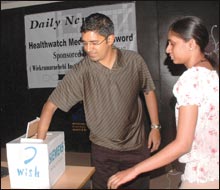 |
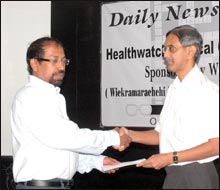 |
| The first
prize winner being picked up by the Australian Trade Commissions
Business Development Manager in Sri Lanka Shameel Javadh.
Pictures by Sudath Nishantha |
Medical
Crossword sponsor WISH Institute Head Mihiri Wickremarachchi
(left) presenting Glen Fernando (representing the Medical
Crossword No. 37 first prize (Rs. 3000) winner P.M. Batholameusz)
with the cheque. |
Consolation prize winners:
Pair of sunglasses each: 1. Entry No. 15 - Hashini Jayasingarachchi,
Colombo 10. 2. Entry No. 83 - Safaz Saleem, Colombo 15. 3. Entry No. 10
- G. K. M. de Soysa, Gampola.
Our congratulations to all the winners, Daily News Editorial,
HealthWatch Coordinator and Medical Advisory panel, and the crossword
sponsors WISH Institute and its head Mihiri Wickremarachchi.
Medical Crossword No. 38 correct solution
Across: (2) Brain, (4) Paracetamol, (9) Laptop, (10) Male,
(12) Nasaid, (15) Soya, (16) Spondylosis, (17) Rest, (18) Fractures,
(19) Incontinence.
Down: (1) Air, (5) Arthroplasty, (6) Asprin, (7) Exercise, (8)
Rheumatoid, (10) MRI, (11) Virus, (12) Disc (14) Posture.
The grid was drawn by Dr. Kelum Pelpola of the Sri Jayawardenapura
Hospital, Kotte.
Living your lifestyle
During the past forty years it has gradually become apparent that
many of the prevalent diseases in the world are not due to infectious
organisms but to the way people live, that is, their lifestyle. Disease
that fall into this category include coronary heart disease, stroke,
cancer, high blood pressure, diabetes, tooth decay, and skin cancer.
 To these might be added those disorders related directly or
indirectly to the fast pace of life and the pressures and emotional
conflicts at the workplace, in the home, and in society at large. Among
these are peptic ulcers, colitis, eczema, heart irregularities, asthma,
depression, neuroses and psychosis. To these might be added those disorders related directly or
indirectly to the fast pace of life and the pressures and emotional
conflicts at the workplace, in the home, and in society at large. Among
these are peptic ulcers, colitis, eczema, heart irregularities, asthma,
depression, neuroses and psychosis.
Modern man, living in the large cities of the world with his advanced
technologies, is denied many of the conditions that make for physical
well-being. Instead, he is constantly faced with forces that destroy
health. There is not need for physical work, so he remains under
exercised. He tends to eat too much of food that is nutritionally poor.
He is constantly stimulated and has little opportunity to relax.
He is lost in a sea of humanity, in which self-restraint and
self-discipline are often easily overruled. His physical demands are
low, while his emotional pressures are high.
As a result, he suffers from diseases of disuse on the one hand and
the tension diseases on the other.
Maintaining good health means avoiding all deficiencies and excesses
that cause an imbalance, lower resistance, and so contribute to disease
and death. In order to keep all your functions at peak performance, you
must use them judiciously, rest them adequately, meet their needs fully,
and provide them with a harmonious internal and external environment.
Here are the main components of a healthful lifestyle:
Exercise is a must, for what you don't use, you lose. It should be
appropriate to your needs and you should enjoy it.
Rest and sleep to keep you feeling refreshed and strengthened -
renewed for each day's activities.
Nutritious food, eaten at regular times, of maximum quality and
minimum quantity.
Water, pure and soft, used generously both internally and externally.
Fresh air, breathed deeply both day and night.
Sunshine: Not too much but enough to provide you with its rich
benefits. Enough is enough: recognizing balance and avoiding extremes.
Avoid hindrances: Chemical crutches such as alcohol, tobacco and
other drugs that provide an illusion of well-being but are actually very
self-defeating.
Mental serenity: In a mind that is consistently challenged with
ennobling thoughts, flavoured with a consciousness of doing right.
Emotional composure, unperturbed, under conflict and abuse and
pervaded with a spirit of cheerfulness and joy.
Trust in divine power, under girding your weakness and empowering
your resolve.
May your lifestyle bring you a long, healthy life and much happiness.
Sent by Dr. Dennis J. Aloysius in our medical advisory panel for use
in the healthwatch. Dr. W.A. Ferdinand |



